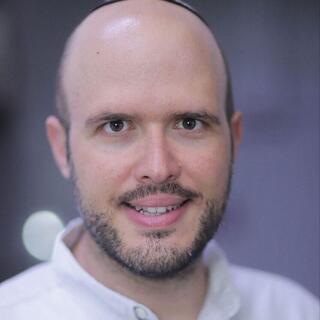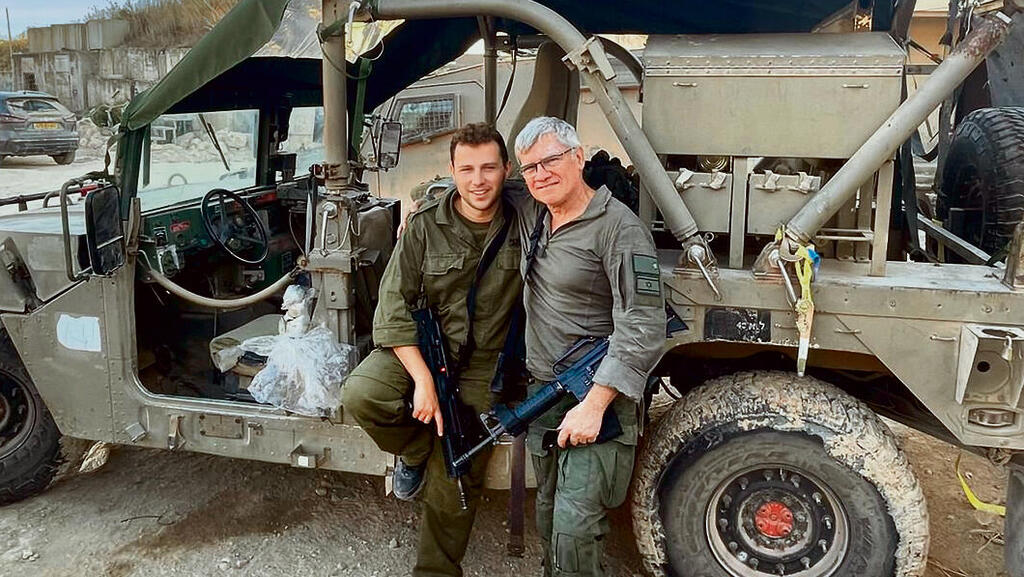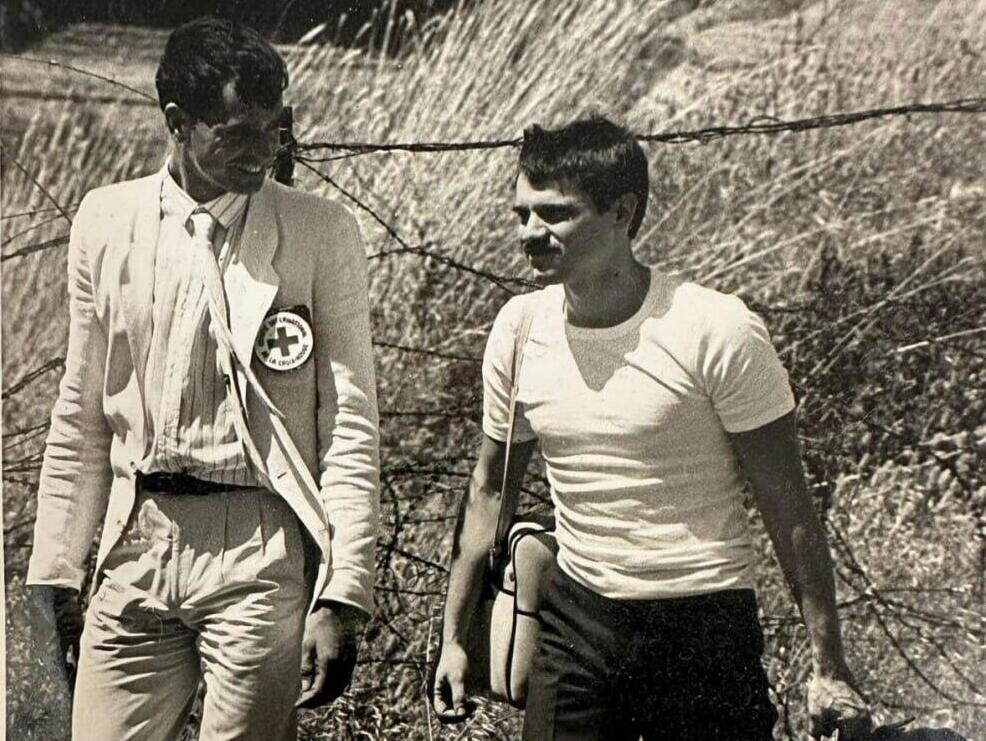Getting your Trinity Audio player ready...
For months, he was held and tortured in Syria’s infamous Al-Mezzeh prison in Damascus. Years later, he became a renowned heart and chest surgeon, rescued his injured son from deep in the Amazon rainforest, and now the two serve together on the northern front.
Together, Reserve Major Professor Nahum Nesher and his son, Koren, have clocked 250 cumulative days of reserve duty in one of the tensest locations along the Syrian border: the high-altitude Hermon outposts. Nahum, a 63-year-old military physician and a professor at Ichilov Hospital—considered one of Israel’s leading thoracic surgeons—carries a medical pack weighing dozens of kilograms and joins combat troops of Battalion 920 from the Northern 769th Brigade in deep enemy territory. His son, Koren, a law and business student at Reichman University, serves as a combat soldier in the same reserve battalion.
Both could have been elsewhere. But they chose to don their uniforms and are now completing their fourth deployment since the war broke out. Despite the heavy toll of reserve service, they make it clear they have no intention of skipping the next call-up. “We’re not blind or stupid. We see what’s going on around us,” says Nahum. “If no one mans the border, we won’t have a country.”
Back to enemy territory
Nahum’s connection to the Syrian front runs deep. In 1984, while serving in an intelligence role, he was captured by Syrian soldiers and taken prisoner. He spent three months in a security prison in Damascus, enduring brutal interrogations and horrific conditions. “I got out by the skin of my teeth,” he recalls. “But not a day goes by that I don’t carry it with me. I’m probably the only person ever to voluntarily return to the country where he was once held captive.”
Despite the deep physical and emotional scars, Nahum went on to complete medical school and even returned to military service. His last reserve position was as the medical commander of the Home Front Command’s elite search-and-rescue unit. He officially completed his reserve duty in 2005 and never imagined he’d wear a uniform again. Then came the war in October 2023. A few months later, after performing dozens of life-saving surgeries on victims of the Hamas massacre and the fighting that followed, a phone call from his son changed everything.
Koren, who was severely injured in a car accident in South America after his release from the Paratroopers’ 890th Battalion, had been classified as exempt from reserve duty. But as recruitment rates dropped, he got a call from his commander asking him to return to help support the unit. “They told me they needed help, that the guys were exhausted. I didn’t think twice,” Koren says. “It’s cost me in school and my pace of life, but I know what matters.”
When the battalion later faced a shortage of medical staff, Koren half-jokingly suggested his father join him. “Like a true dad, he didn’t ask questions. He just said, ‘I’m coming with you,’” Koren recalls. “He’s not 20 anymore, but you’d never know it. He runs with us between the hills, hauls medical gear, and projects a strength I can’t explain. Just having him here gives the entire unit a massive boost—from the battalion commander to the kitchen staff.”
A story of heroism and pain
Since April 2023, the two have taken part in the ground maneuver to destroy Hezbollah’s terror infrastructure in southern Lebanon. Nahum has saved lives and treated wounded soldiers under fire. When the operation shifted to Syria, there was no hesitation on his part—he would not leave his battalion or his son.
“Crossing into Syria again wasn’t easy, but it moved me so much that I recited the Shehecheyanu blessing while wrapped in an Israeli flag on top of Mount Hermon,” says Nahum. “I’ve been carrying the trauma of captivity for 41 years, and so has my family. But since October 7, with the knowledge of the hostages still in Gaza, that open wound burns even more.”
Koren adds: “More than anyone, I understand the meaning of the phrase ‘we don’t leave anyone behind.’ My dad is living proof of that. Every day, I ask myself: 'What does it mean to be the son of a former POW?' It’s a story of heroism, but also of pain. And from that, I’ve learned how to be a better person.”
Get the Ynetnews app on your smartphone: Google Play: https://bit.ly/4eJ37pE | Apple App Store: https://bit.ly/3ZL7iNv
“It’s hard to put into words the range of emotions that come with fighting shoulder to shoulder with your father,” says Koren. “There’s the constant worry—after all, he’s my dad. But his presence gives me a sense of security that’s hard to describe—not just for me, but for the whole battalion. I’ve seen the effect he has on soldiers and officers alike.”
He continues: “My father always says, ‘If the Syrians didn’t break me, no one can.’ He doesn’t say it to impress, but to remind us that no matter the era, our spirit is stronger than any harsh reality. It’s become my inner compass—when things get hard, I hear his voice and know I can keep going.”
Not looking sideways
Their story inevitably touches on the national debate over the burden of military service, especially as large portions of the ultra-Orthodox population continue to refuse enlistment and the number of reservists returning for multiple rounds of duty declines.
“When you realize you’re part of just 3% of the country, while everyone else enjoys the quiet you help provide—it’s not easy,” admits Koren. “But I don’t look sideways. I choose to do the best I can. I look at my father, a 63-year-old heart surgeon, who could stay home and operate, but instead shows up. Some people run away, but he comes.”
On rare breaks from the front at their home in central Israel, Professor Nahum jumps into the operating room, filling every free hour with complex surgeries. “Something here just isn’t working,” he says. “If I have to leave patients who urgently need me to go to the front, something is wrong. But I can’t fix the country—only do what little I can. As long as I’m needed, I’ll be there.”





